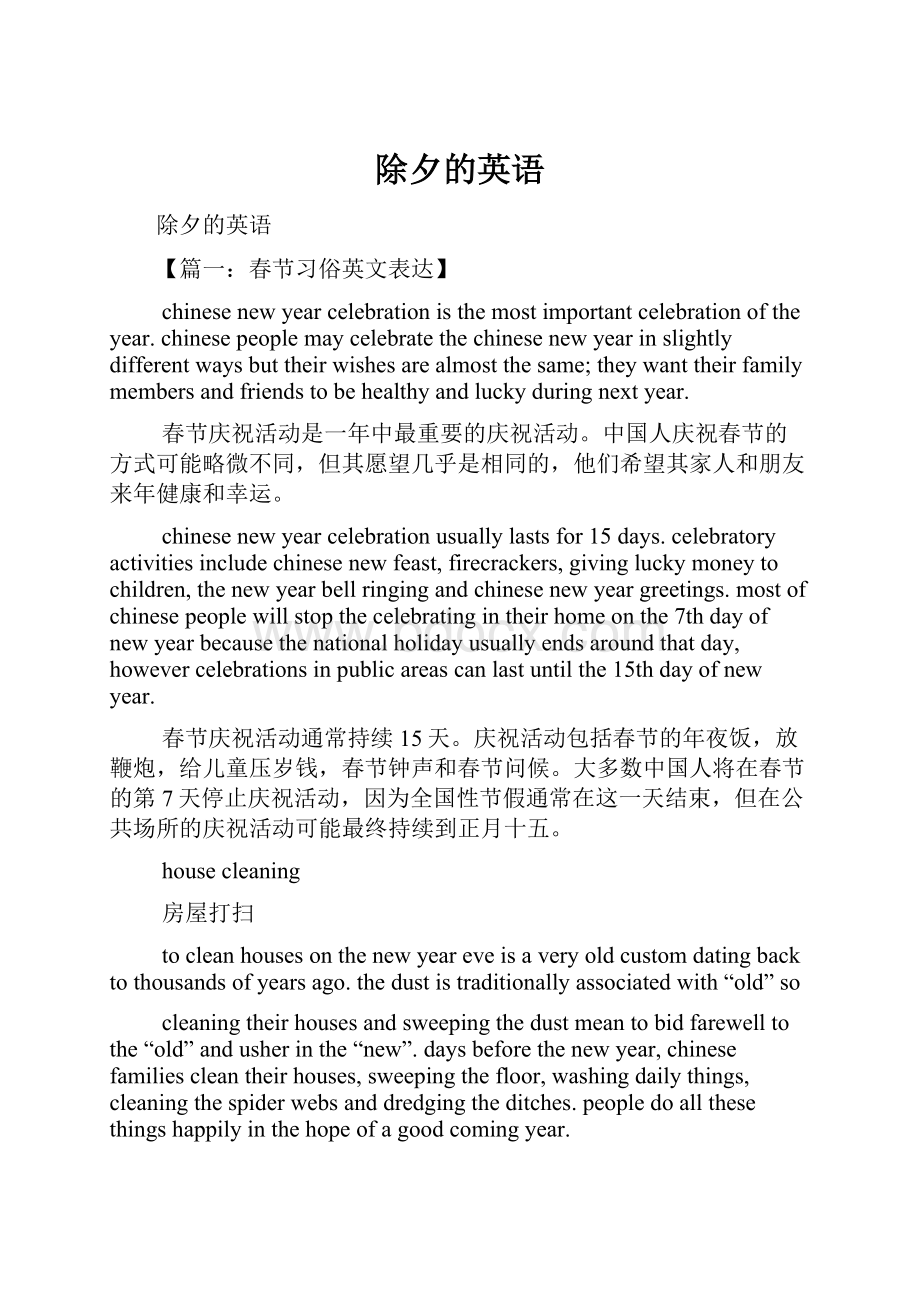除夕的英语Word下载.docx
《除夕的英语Word下载.docx》由会员分享,可在线阅读,更多相关《除夕的英语Word下载.docx(14页珍藏版)》请在冰豆网上搜索。

灰尘在传统上与“旧”联系在一起,所以打扫房屋和扫除灰尘意味着辞“旧”迎“新”。
春节的前几天,中国的各家各户都打扫房屋,扫地,清洗日用品,清除蛛网和疏浚沟渠。
人们兴高采烈做所有这些事情,希望来年好运。
housedecoration
房屋装饰
oneofthehousedecorationsistopostcoupletsondoors.onthespringfestivalcouplets,goodwishesareexpressed.newyearcoupletsareusuallypostedin
pairsasevennumbersareassociatedwithgoodluckandauspiciousnessinchineseculture.
房屋装饰之一就是在门上贴对联。
在春联上,抒发良好的祝愿。
春联通常是成对张贴,因为双数在中国文化中是好运气和吉祥的象征。
peopleinnorthchinaareusedtopostingpaper-cutontheirwindows.whenstickingthewindowdecorationpaper-cuts,peoplepasteonthedoorlargeredchinesecharacter“fu”aredfumeansgoodluckandfortune,soitiscustomarytopostfuondoorsorwallsonauspiciousoccasionssuchaswedding,festivals.在中国北方,人们习惯于在窗户上贴剪纸。
人们既在窗户上贴剪纸,又在大门上贴上大大的红色汉字“福”字,一个红色“福”字意味着好运和财富,因此习惯上在婚礼,节日之类的吉祥场合中,人们都会在门或墙上贴“福”字。
waitingforthefirstbellringingofchinesenewyear
等待春节的第一声钟鸣
thefirstbellringingisthesymbolofchinesenewyear.chinesepeopleliketogotoalargesquareswheretherearehugebellsaresetuponnewyear’seve.asthenewyearapproachestheycountdownandcelebratetogether.the
peoplebelievethattheringingofhugebellcandriveallthebadluckawayandbringthefortunetothem.inrecentyears,somepeoplehavebegungoingtomountaintemplestowaitforthefirstringing.hanshantempleinsuzhou,isveryfamoustempleforitsfirstringingofthebelltoheraldchinesenewyear.manyforeignersnowgotohanshantempletocelebratechinesenewyear.第一次钟声是春节的象征。
中国人喜欢到一个大广场,那里有为除夕设置的大钟。
随着春节的临近,他们开始倒计数并一起庆祝。
人们相信了大钟的撞响可以驱除霉运,带来好运。
近年来,有些人开始去山上寺庙等待第一次钟声。
苏州的寒山寺就非常著名,它的钟声宣布春节的到来。
现在有许多外国人也去寒山寺庆祝春节。
stayinguplate(shousui)
熬夜(“守岁”)
shousuimeanstostayuplateorallnightonnewyearseve.afterthegreatdinner,familiessittogetherandchathappilytowaitforthenewyear’sarrival.守岁意味着除夕夜不睡觉。
年夜饭后,家人聚坐一起,愉快聊天,等待春节的到来。
newyearfeast
年夜饭
springfestivalisatimeforfamilyreunion.thenewyearsfeastisamustbanquetwithallthefamilymembersgettingtogether.thefoodeatenonthenewyearevebanquetvariesaccordingtoregions.insouthchina,itiscustomarytoeatniangao(newyearcakemadeofglutinousriceflour)
becauseasahomophone,niangaomeanshigherandhighereveryyear.inthenorth,atraditionaldishforthefeastisjiaoziordumplingsshapedlikeacrescentmoon.
春节是与家人团聚的时间。
年夜饭是所有家庭成员聚在一起“必须”的宴会。
除夕宴会上吃的食物根据不同的地区各不相同。
在中国南方,习惯吃“年糕”(糯米粉制成的新年糕点),因为作为一个同音字,年糕意味着“步步高升”。
在北方,年夜饭的传统饭是“饺子”或像月牙儿形的汤圆。
settingfirecrackers
燃放鞭炮
lightingfirecrackersusedtobeoneofthemostimportantcustomsinthespringfestivalcelebration.however,concerningthedangerandthenegativenoisesthatlightingfirecrackersmaybring,thegovernmenthasbannedthispracticeinmanymajorcities.butpeopleinsmalltownsandruralareasstillholdtothistraditionalcelebration.rightastheclockstrikes12oclockmidnightofnewyearseve,citiesandtownsarelitupwiththeglitterfromfireworks,andthesoundcanbedeafening.familiesstayupforthisjoyfulmomentandkidswithfirecrackersinonehandandalighterinanothercheerfullylighttheirhappinessinthisespecialoccasion,eventhoughtheyplugtheirears.
放鞭炮曾是春节庆祝活动中最重要的习俗之一。
然而,担心燃放鞭炮可能会带来危险和烦人的噪音,政府已在许多大城市下令禁止燃放鞭炮。
但在小城镇和农村地区的人们仍然坚持这种传统的庆祝活动。
除夕夜一旦时钟撞响午夜12点钟,城市和乡镇都被烟花的闪闪光芒映亮,鞭炮声震耳欲聋。
一家人熬夜就为这个欢乐的时刻,孩子们一手拿鞭炮,一手拿火机兴高采烈地点放着他们在这个特殊节日的快乐,尽管他们吓得捂着耳朵。
newyeargreetings(bainian)
春节的问候(拜年)
onthefirstdayofthenewyearorshortlythereafter,everybodywearsnewclothesandgreetsrelativesandfriendswithbowsandgongxi(congratulations),wishingeachothergoodluck,happinessduringthenewyear.inchinese
villages,somevillagersmayhavehundredsofrelativessotheyhavetospendmorethantwoweeksvisitingtheirrelatives.
在春节第一天或此后不久,大家都穿着新衣服,带着弓向亲戚和朋友打招呼并恭喜(祝贺),彼此祝愿在新的一年里好运,幸福。
在中国农村,有些村民可能有数以百计的亲戚,所以他们不得不拿出两个多星期来走亲访友。
onthefirstdayofthenewyear,it’scustomaryfortheyoungergenerationstovisittheelders,wishingthemhealthyandlongevity.
春节第一天,按习惯,小一辈人要拜见老一辈,祝愿他们健康长寿。
becausevisitingrelativesandfriendstakesalotoftime,now,somebusypeoplewillsendnewyearcardstoexpresstheirgoodwishesratherthanpayavisitpersonally.
因为探亲访友花费大量时间,所以,现在有些忙碌的人就送春节贺卡来表达他们的良好祝愿,而不是亲自去拜访。
luckymoney
压岁钱
itisthemoneygiventokidsfromtheirparentsandgrandparentsasnewyeargift.themoneyisbelievedtobringgoodluck,wardoffmonsters;
hencethenameluckymoney.parentsandgrandparentsfirstputmoneyinsmall,
especially-maderedenvelopesandgivetheredenvelopestotheirkidsafterthenewyearsfeastorwhentheycometovisitthemonthenewyear.theychoosetoputthemoneyinredenvelopesbecausechinesepeoplethinkredisaluckycolor.theywanttogivetheirchildrenbothluckymoneyandluckycolor.
这是孩子们的父母和祖父母给他们作为春节礼物的钱。
压岁钱据说能带来好运,能驱魔;
因此,就有了“压岁钱”的称呼。
父母和祖父母先把钱放入特制的小红包里,年夜饭后或当孩子们来拜年时,将红包发给他们。
他们之所以要把钱放到红包里,是因为中国人认为红色是个幸运色。
他们想给自己孩子既有压岁钱还有幸运色。
‘中国新年(chinesenewyear)’或‘春节(springfestival)’是最重要的中国传统节日(traditionalchineseholiday),也叫‘农历新年(lunarnewyear)’。
这个节日从农历正月初一(thefirstdayofthefirstlunarmonthinthechinesecalendar)开始,直到正月十五元宵节(lanternfestival)结束。
除夕(chinese
newyearseve)的字面含义是‘year-passeve’。
据说当初春节是为了纪念与一头叫做‘年’的神话野兽进行的斗争(fightagainstamythicalbeastcallednian)。
中国的阴阳历(lunisolarcalendar)而不是公历(gregoriancalendar)决定了春节的日期。
天干(heavenlystems)和地支(earthlybranches)用来纪年。
阴阳(yinandyang)与五行(thefiveelementsofchineseastrology)也用来描述一个具体年份。
很多人混淆了他的农历生年(chinesebirth-year)和公历生年(gregorianbirth-year)。
有些算命的人(signcalculators)也会混淆农历和阳历。
12年形成一个属相(animalzodiac)循环(cycle);
60年形成一个综合循环。
十二属相(zodiacanimalsigns)包括:
鼠(rat)、牛(ox)、虎(tiger)、兔(rabbit)、龙(dragon)、蛇(snake)、马(horse)、羊(ram/sheep)、猴(monkey)、鸡(rooster)、狗(dog)与猪(pig)。
春节在很多国家和地区(countriesandterritories)都是公共假期(publicholiday),包括中国大陆、中国台湾、中国香港、中国澳门、马来西亚、新加坡、文莱(brunei)、印度尼西亚和菲律宾。
还有一些国家以其它方式纪念中国春节,包括澳大利亚、加拿大、法国、新西兰和美国等。
在正式假期(officialholiday)前后,庆祝活动(celebrations/festivities)一直在进行。
各国对春节规定的法定假期(statutoryholiday)长短不一。
春节期间的庆祝活动中最重要的是拜访亲朋好友(visitstokin,relativesandfriends),即‘拜年(new-yearvisits)’。
青年人(juniors)和孩子(children)可以从已婚者(themarried)和长辈(theelders)那里拿到红包(red
packets/envelope)。
红包也叫压岁钱,是从‘压祟钱(themoneyusedtosuppressorputdowntheevilspirits)’发展而来。
钱数应为偶数(evennumbers),因为奇数(oddnumbers)不吉利。
数字4被认为不吉利,因为和‘死’同音(ahomophonewithdeath);
数字8吉利,因为和‘发(wealth)’同音。
互赠礼物(giftexchange)也是人们之间常有的事儿。
春节前一般要彻底打扫卫生(athoroughcleaning),以扫掉前一年的坏运气(tosweepawaythebadluckoftheprecedingyear)并迎接好运(tobereadyforgoodluck)。
房间要用带有吉利话(auspiciousphrases)的剪纸(papercutouts)和春联(couplets)进行装饰。
信佛(buddhism)和信道(taoism)的人会将神坛(altar)与塑像(statues)清理干净。
某些地区的人会有‘送神
【篇二:
五人英语话剧剧本-除夕】
英语话剧剧本
newyear’seve
除夕的传说,一个很优秀的剧本,讲述了除夕的传说,就是有一个怪物叫“夕,每到腊月的最后一天会出来害人...
characters
monsterwholikestoeatpeople,especiallyonchinesenewyear’seve
oldladyawhosehusbandandchildrenwereeatenbythemonster
oldladybwhocomestohelpoldladyatofightwiththemonster
neighborsc()
neighborsd()
neighborse()
)())((
scenei
setting:
c、d、eandoldladyaareinthevillage.atrise:
c、d、earetalkingtooneanother.
c:
tomorrowischinesenewyear’seve.
d:
oh,mygod!
it’schinesenewyear’seveagain.
e:
wemustrunawaytodayorwewillbeeatenbytheterriblemonster.
yes,irememberitcomestothevillageeveryyear.d:
andeatallthepeople.
that’sterrible!
oldladya’shusbandandchildrenwereeatenbythemonsterlastyear.
oh,thatpoorladywholostherfamily.shemustbeverysad.d:
wemusttellhertorunawaywithus.e:
yes,don’tletthetragedyhappenagain.
cde:
(runtotheoldladya’shome)oldlady,oldlady,youmustrunawaywithusnow.
yes,takeyourbaggageandgowithus.d:
hurryup,wehavenotimetowaste.
a:
no,iwanttostayhere.e:
why?
iwanttofightwiththemonster!
itkilledmyfamily.ineedtotakerevengeonit.
no,no,no,it’snotsafe.
youwon’twinbyyourself!
andyouwillbeeaten,too.
youmustgowithus!
!
i’mtooold,andidon’twanttokeeplivingwithoutmyfamily.imustkillitbeforeidie.
youareacrazywoman.justsuityourself.(c,d,erunaway)
sceneii
oldladybisatoldladya’shome
atrise:
oldladyaiscookingdumplings.oldladybisknockingatthedoor.
b:
anyonehome?
(opensthedoor)whatareyoudoinghere?
yo